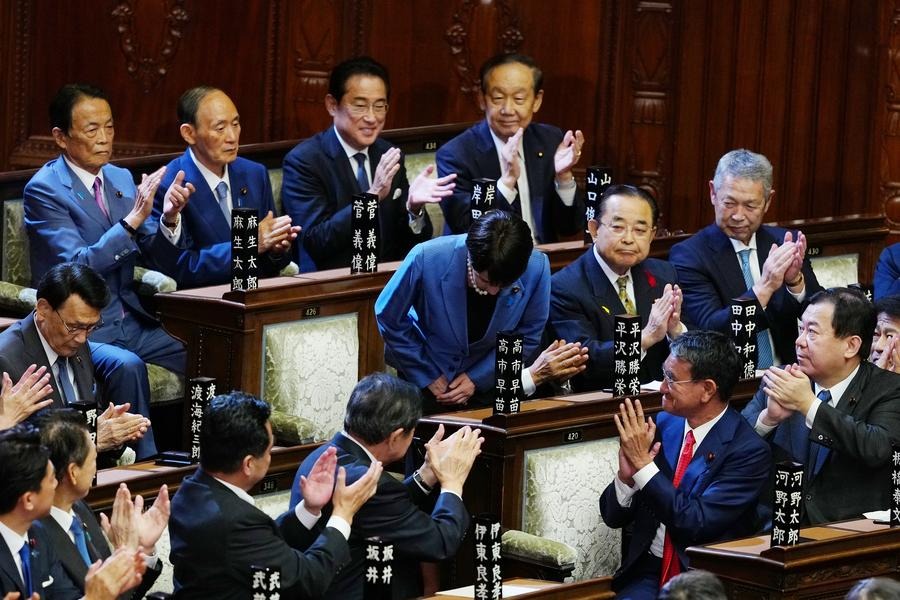UK's COVID-19 economic fallout: Is the worst behind us?


Editor's note: As governments around the world seek to save lives by slowing down the spread of the coronavirus, they have to take dramatic measures, with big implications for economic activity. John Ross, former Director of Department of Economy and Business Policy in London and senior fellow at Chongyang Institute for Financial Studies of the Renmin University of China, shares his thoughts on the economic impact of the coronavirus pandemic across the UK.
Q1:The UK's composite PMI, service industry PMI and manufacturing industry PMI are all back on entrepreneurs' confidence thresholds. However, the UK's GDP has shown its largest negative growth in years. What do you think of the deviation of these two indicators? Also, what factors do you think will affect the UK's economic situation in the second quarter? What is the expected direction of the UK's economy in the second half of the year?
A1: The recession in Britain is the worst in any G7 country due to the government's complete mishandling of the coronavirus situation. Britain has one of the highest cumulative per-capita coronavirus death rates in the world – in Europe, only Belgium in Spain are worse.
The reason for this extremely bad health situation is that a lockdown, of a not fully effective type, was introduced much too late. Even though Britain has a natural advantage for dealing with international pandemics due to being an island, no ban was placed on travelers from highly infected countries entering the country for months.
This is in complete contrast to New Zealand, which used its similar geographical advantage to ban all foreign travelers from entering the country - with the result that New Zealand had, with China and parts of East Asia, one of the best results in the world in fighting COVID-19.
Due to these huge government mistakes in dealing with the virus, the UK economic downturn was also exceptionally severe.
The UK recovery only appears 'fast' in the latest data because the downturn was so exceptionally severe. The British economy remains in an extremely depressed state.
Meanwhile the number of new coronavirus cases is starting to rise again – due to a premature lifting of an ineffective lockdown in comparison to the most successful countries.
In short, the interlinked coronavirus and economic situations in the UK remains one of the worst in an advanced country.
Q2: Currently, the UK is in a transitional period due to Brexit and is also negotiating trade cooperation with several countries. The UK and the US are allies. How do you see the trade cooperation evolving between the two countries? What areas do you think will be the focus of the trade agreement program? At the same time, the UK and Japan are also hoping for an FTA, do you think there is potential for trade cooperation there? How much of an impact will Brexit have on the UK in terms of trade? What do you think of the prospects of trade cooperation between Britain and China?
A2: The aim of Brexit, for the dominant forces in Britain which supported it, was to subordinate Britain more closely to the US – Britain is far too small an economy to pursue an independent course between the two large economic blocs of the US and EU.
The Trump administration supported Brexit for the same reason. It wanted Britain to become more economically subordinate to the US. This means, in term of internal British policies, a reduced social protection of the population, making it easier to dismiss workers, lowering food standards and environmental regulation down to US levels, and even greater US control of UK foreign policy.
Britain wants to negotiate free trade agreements with other countries such as Japan but, given the overall relation of forces, in reality these can only be concluded on terms which the US agrees to.
The effects of this Brexit orientation of subordination to the US can therefore be seen, for example, in the Johnson government reversing its previous position of allowing Huawei to participate in the UK's development of 5G and instead accepting the demands of the Trump administration that Huawei be excluded.
This will inevitably have a negative effect on Britain's economic relations with China. But all these policies are against the interests of the British economy, and will also be affected by the outcome of the UK's final trade relations with the EU – which is not yet decided. Therefore the struggle around them will continue.
Q3: In the economic area, the banking sector in the United Kingdom occupies a pivotal position. Recently, UK banks have also been releasing their financial reports for the first half of the year. Is Brexit a major shock to UK banks, or a huge transformational opportunity?
A3: Brexit will have a negative effect on UK banks – although how negative depends on what will be the final trade agreement between Britain and the EU. This in turn will not be known until later this year – don't forget that until Dec 31 the UK remains bound by EU rules.
The key issue will be whether British banks are able to maintain their current rights to operate within the EU. If British banks are not able to achieve this, it will significantly negatively affect their activity. But if they are able to continue to operate inside the EU basically on the same basis as European banks, the effect will be marginal.
Similarly, how important it will be for other countries to cooperate with British banks will depend on how much the latter are able to operate in the EU.
Q4:According to the report, almost 730,000 people have been unemployed in the UK since the outbreak of the pandemic, and the UK government has helped businesses pay 9.6 million job positions with nearly £52 billion in wages to keep the unemployment rate at 3.9 percent, but many people believe that unemployment will rise after October as the government terminates the scheme. What do you think about this, and what do you think the UK government should do to reduce unemployment and stabilize society?
A4: It is certain there will be a massive wave of UK unemployment in the autumn. This is because the government has failed to take the measures required to open the economy. Furthermore, the British government has from the beginning adopted the wrong strategy for dealing with coronavirus and continues to do so.
What was required was a very strict lockdown or lockout ('lockout' meaning closing of the borders), of the China, Vietnam or New Zealand type, for six weeks.
International experience shows this would have broken the back of the epidemic, allowing the number of cases to be reduced to a level where any purely local outbreaks can be dealt with. The UK national government had enough resources to sustain the population during a severe six-week lockdown. The UK economy could then be reopened as the number of cases would be very low – as close to zero as possible.
This is known scientifically as an "elimination strategy", or popularly as a Zero-COVID strategy. The devolved government of Scotland did adopt such a strategy, with considerable success.
But instead in England a "half-lockdown" was adopted. This meant the number of COVID-19 cases was never reduced to a low level. Therefore, the economy cannot be reopened safely, and the economic crisis will be severe and drawn out. Therefore, the situation of unemployment will be very severe and the government has no effective strategy for dealing with it.
Q5: As the world economy is unstable, many governments have chosen to adopt a policy of stimulating domestic demand and internal economic circulation. So what do you think is the overall situation of domestic demand in the UK, and can an internal circulating economy help the UK to stimulate economic development?
A5: A policy of economic recovery based essentially on domestic demand can be successfully pursued by very large economies such as the US, the EU or China. But the British economy is too small to base its economic recovery on purely domestic demand.
This is a further illustration of the fact Brexit interacts with the coronavirus crisis. The EU is launching a rather large economic recovery package. If this is pursued vigorously, this creates a serious potential for the EU, whose economy is on the same large scale as the US and China, to recover based on domestic demand. But because Britain is no longer a member of the EU it will not be able to participate in this recovery program.
The situation of the British economy is therefore rather grim – following on from the UK's economic decline in the first half of the year being the worst of any advanced economy. With the UK's own economy too small to launch a domestic recovery, and without a sharp recovery of the international economy, which appears unlikely in the present circumstances, the UK is likely to remain in a severe economic situation. This is an inevitable result of the government's incorrect policies on the coronavirus itself.
Chongyang Institute for Financial Studies of the Renmin University of China conducted this interview. The opinions expressed here are those of the writer and do not represent the views of China Daily and China Daily website.


































